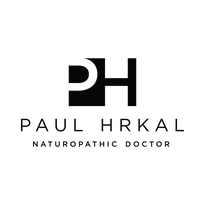 In 2012 I wrote a popular blog about the benefits of lemon water. We have all heard about squeezing half of a fresh cut lemon into a glass of water first thing in the morning. Some of health benefits of this are: Alkalizing our bodies: Despite the acidity of the juice, once it interacts with water molecules and enters the body it actually forms alkaline molecules that contribute to a healthy and balanced pH level. Stimulates the liver and digestion: The acidic and phytochemical properties of lemon “kick start” your digestive organs so they are ready to function well all day. Anti-microbial: Lemon Juice has been traditionally used as a home remedy for a sore throat or cold due to its anti-bacterial properties. Increase hydration: Adding lemon makes the water taste a little better therefore we tend to drink more. Generally, most people don’t drink enough water throughout the day so any little incentive helps, especially right in the morning. However what about lemon slices/wedges they give you at a restaurant? Even health conscious people ask for plain water and lemon instead of drinking alcohol or soda pop. Well, it turns out the lemon wedges actually can do you more harm then good. A study found that most of those lemon slices can be contaminated with bacteria. This can expose you to infection which can cause vomiting and diarrhea. The rinds (the outside of a lemon) also aren't usually washed so they most likely contain pesticide residues as well. YUK! So the last thing you want to do after squeezing the lemon juice into your glass is throw the slice in as well. The best option is discarding it after getting your drink. To be ultra safe you shouldn't even squeeze in the juice.
0 Comments
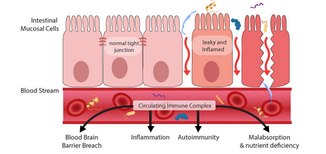 Many of us have heard of the term "leaky gut" syndrome in before. If you haven't you should know about it because it most likely an underlying factor contributing to your health issues. What is leaky gut? The term actually describes pretty much what it is; the lining of your intestines is permeable or "leaky" to substances found in your gut. While this may not seem like a big deal since we would think absorbing things is a good thing but increased intestinal permeability (leaky gut) has been linked to a long list of health conditions. This includes autoimmune diseases (rheumatoid arthritis, skin conditions, multiple sclerosis etc.), cancer, autism, asthma, IBS and inflammatory bowel disease. Why is leaky gut a problem? When the integrity of the intestinal wall is compromised, foreign and allergenic molecules can easily pass from the gut into the area surrounding our intestines. This challenges our immune system, which in turn produces an immune/inflammatory response that is capable of targeting any organ or tissue. The research is clear in showing that a leaky intestinal barrier disrupts the ability of your immune systems to function especially when is comes to tolerating our own cells (autoimmunity). This makes sense since most of our immune system is located right behind our intestinal wall. It acts as our first line of defence, sorting through all the good and bad things that we may be eating. What causes leaky gut? A number of traumatic events such as surgery, organ failure and brain injury have been shown to cause increased permeability. As mentioned above, a number of conditions and diseases have been associated with impaired intestinal permeability but its not totally clear if they are caused by or contribute to leaky gut. I suspect a little bit of both is most correct answer. We do know that deficiencies of essential fatty acids and minerals such as zinc promote leaky gut. Food allergies are another key contributor. Inflammatory and allergenic molecules such as the protein gliadin (similar to gluten) found in wheat, can damage our intestinal wall. One of the most important factors in maintaining a healthy gut is our good bacteria (probiotics). Did you know we have more bacteria in our gut then cells in our body? The problem is that they are constantly being damaged and thrown out of balance. Repeated and chronic use of antibiotics can drastically alter our gut bacteria. Antibiotics often kill the good strains while allowing the harmful strains to flourish since the good guys keep the bad guys in check. Pesticides found on our foods and in our environment also can damage the good bugs in our gut. What can we do about leaky gut? 1) Avoid repeated use of antibiotics and supplement with a high dose probiotic if you ever have to use them. Fermented foods such as sauerkraut and kimchi are also a great source of good probiotics. 2) Avoid pesticides: Eat organic fruits and veggies and antibiotic free meat products 3) Identify food allergens: this is highly individual so getting a blood test to see what you are sensitive to is often the simplest way to avoid foods that may be promoting intestinal inflammation and damage. A naturopathic doctor can help you with this process. 4) Replace nutrient deficiencies: trace minerals such as zinc and omega 3 fatty acids found in flax, chia, hemp or fish oils are very important for optimal gut healing and function. 5) Get more good bacteria: supplement with a multi-strain, high dose probiotic formula. Our gut bacteria are always under assault so keep your gut lining tight by maintaining optimal levels. 6) Supplement with extra antioxidants such as quercetin which is naturally found in onions and fruit. Also include the amino acid glutamine which is a key fuel source for intestinal cells. References Groschwitz KR, Hogan SP. Intestinal barrier function: molecular regulation and disease pathogenesis. J Allergy Clin Immunol. 2009; 124:320; quiz 21-22. 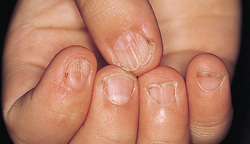 While eating a well-balanced, whole foods diet is essential for disease prevention and the maintenance of health is it enough if you are deficient in key vitamins and minerals? What are the signs and symptoms of deficiencies the you can observe our your body? The following is quick guide to signs that may suggest deficiency in certain nutrients. Remember these are just signs and can vary in different people. Each sign can often mean multiple things that aren’t necessarily related to a deficiency. This should not replace proper medical examination and laboratory testing. Head Thin, dry hair: low thyroid function or essential fat acid deficiency Hair loss: zinc deficiency Dandruff: zinc and essential fatty acid deficiency Noise sensitivity: Magnesium deficiency Excess earwax: fat deficiency Face Dry, cracked lips: B-vitamin deficiency Tingling lips: calcium or vitamin D deficiency (also consider a herpes infection) Pale under eyelids: anemia Blood vessels visible around nose and cheeks: gastric (hydrochloric) acid deficiency Goiter/swollen thyroid: Iodine deficiency (now very uncommon in North America) Loss of smell: zinc deficiency Light sensitivity: B2 deficiency Eye twitches: Magnesium deficiency Mouth Bright purple/red tongue: vitamin B2, B3 or B12 deficiency Loss of taste: zinc deficiency Spongy gums and loose teeth: vitamin C deficiency Hoarse voice: iron deficiency (also consider low thyroid function) Body Easy bruising: iron, vitamin K or vitamin C deficiency Tingling in hands (carpal tunnel): B6 deficiency White specks in nails: zinc deficiency Ridges in nails (longitudinal): gastric (hydrochloric) acid deficiency Brittle nails: zinc and sulfur deficiency Frequent muscle cramps: magnesium and potassium deficiency Red palms: B-vitamin deficiency Pale skin: iron deficiency anemia Note: This list is NOT meant to diagnosis medical conditions. Please see you licensed healthcare practitioner with any concerns. 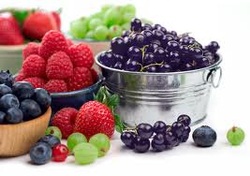 We live in a world of calorie dense but nutrient poor foods. Do to over farming and poor agricultural practices many vegetables, fruits and grains have lower amounts of minerals and vitamins then they had in the past. While the trend is moving toward organic and whole food options the question is can a healthy diet still provide enough nutrients and vitamins to meet our daily needs? Most experts agree that a well rounded, plant based, whole foods diet is more then adequate to meet the needs of most healthy people but what about if you are deficient in a particular nutrient? Is diet enough to correct it? What’s the difference between measurable and functional (the optimum a your body needs to function) deficiency? Clinical experience among Naturopathic doctors suggests for people with deficiencies extra supplements are needed to restore adequate levels. A good way to look at this is while a balanced diet is great for maintenance of nutrient status but if you have a health condition you are in a “health rut” and you need a little extra help to get out. This is where extra minerals and vitamins can be very useful. The following are a few conditions or situations where deficiencies of minerals or vitamins can play a role in the disease process. Adequately replacing these essential nutrients may help reverse the conditions. High blood pressure: Magnesium plays a key role in blood vessel relaxation. Low levels lead to constricted blood vessels and increased pressure. Chronic magnesium deficiency also allows calcium to build up in the lining of the vessels creating constriction and hardening. Depression: Zinc, magnesium, vitamin B6 and B3 are all essential for the formation of the “feel good” neurotransmitter serotonin. Deficiencies in the above nutrients can lead to poor production of serotonin and melatonin decreasing mood and impairing sleep. Unfortunately, anti-depressant drugs don’t address this root cause since they don’t increase production of serotonin but only keep it in the brain longer. Hypothyroidism: Most people have heard of iodine being essential to thyroid hormone production but selenium and zinc are also required in this process. Selenium is especially important since it is required for the conversion of T4 to T3 (the active form of thyroid hormone) in the liver and peripheral tissues. Additionally it also reduces autoimmunity against the thyroid gland (Hashimoto’s thyroiditis). Acne: Zinc plays an essential anti-inflammatory role by stabilizing the immune system. When levels are low people may be predisposed to more acne outbreaks and increased severity. It’s important to note that copper should always be supplemented along with zinc since long-term zinc use can lead to a copper deficiency. Fibromyalgia: Magnesium is a key factor in muscle function and some research shows that people with fibromyalgia have low intracellular magnesium levels despite blood levels being normal. The combination of magnesium and malic acid has been shown to have a positive effect on symptoms. Restless legs syndrome (RLS): Iron is an often-overlooked mineral in RLS. It is required for the formation of dopamine in the brain, which regulates muscle movement. Before supplementing be sure to get your ferritin levels checked to see if you are iron deficient. References Altura et al. Magnesium deficiency upregulates sphingomyelinases in cardiovascular tissues and cells: cross-talk among proto-oncogenes, Mg(2+), NF-κB and ceramide and their potential relationships to resistant hypertension, atherogenesis and cardiac failure. Int J Clin Exp Med. 2013 Oct 25;6(10):861-79. Moorkens et al. Magnesium deficit in a sample of the Belgian population presenting with chronic fatigue. Magnes Res. 1997 Dec;10(4):329-37.  There has been a tremendous amount of research done on aging and longevity. It is been long known that caloric restriction has a positive effect on longevity. However one of the latest discoveries is that fasting could actually dramatically reduce the risk of cancer, diabetes, alzheimer's disease and cardiovascular disease. The evidence is showing that short term caloric restriction (2-4 days) has multiple favourable effects on our physiology. When it comes to cancer a number of studies have shown that fasting improves the effectiveness of chemo therapy and radiation. It seem like this effect is linked to caloric restriction reducing IGF-1, a growth hormone secreted by our body to promote cell multiplication. In fasting, IGF-1 goes down and instead of growing, cells focus on repairing and re-building themselves. This offers a protective effect to healthy cells and may inhibit the spread and growth of cancer cells. Interestingly, high protein intake is one of the most potent stimulators of IGF-1 production in the liver. Many of the most popular "healthy" diets are plant-based and low in processed foods. Specific anti-cancer diets like the ones outlined in the China Study by Dr Colin T Campbell and the Gerson diet are low protein, vegetarian diets. These diets tend to be lower in calories and animal meats but higher in nutrients so they inherently will decrease IGF-1 production. It seems like the bottom line is that eating less calories, especially animal meats and refined sugars, will have a positive effect on any disease process. If you think fasting for 3 days is to difficult, intermittent fasting is another option where you eat normally for 5 days and then eat 600cal for 2 days/week. Preliminary evidence shows that this approach harnesses the beneficial effects of fasting without the extended restrictive periods. I recommend that you see a a health care practitioner before you try fasting since there are some cases it may not be right for you and could be harmful. If you have cancer, then you should have a consult with a ND that has experience in this field. Watch this video for a great overview http://www.dailymotion.com/video/xvdbtt_eat-fast-live-longer-hd_shortfilms References: Longo and Fontana. Calorie restriction and cancer prevention: metabolic and molecular mechanisms Trends Pharmacol Sci. 2010 February ; 31(2): 89–98. doi:10.1016/j.tips.2009.11.004 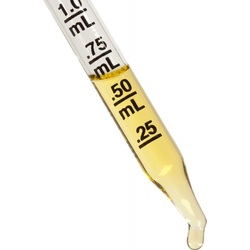 Vitamin D is one of the most widely accepted and rigorously researched natural substances. Numerous government and scientific agencies support vitamin D for health conditions such as bone health, cancer prevention and immune function. However, a recent meta-analysis suggests that the health links to vitamin D are weak and unconfirmed.1 Critics have already slammed the study on a number of points, calling into question its conclusions.2 Vitamin D is one of few topics that conventional and alternative medicine can actually agree about since the evidence to date is overwhelmingly positive. Have we all been wrong about the benefits of vitamin D? As with all new studies and reviews this one also deserves a closer look to confirm the conclusions. 1) Beware shock and awe titles: The conclusion of the aforementioned study states that “highly convincing evidence of a clear role of vitamin D does not exist for any outcome, but associations with a selection of outcomes are probable.” This seems like a cautious and conservative statement which is no surprise considering the type of review it is and the nature of vitamin D testing and supplementation (keep reading below for detiails) however sensationalist titles like “Vitamin D Supplements Don't Help Your Health” (wedMD) don’t accurately reflect the details of the paper.3 2) The most recent study was a meta-analysis of systematic reviews and meta-analyses. This approach is problematic for making meaningful conclusions from the results because the board and general viewpoint loses any of the important details of each study. A good analogy is zooming out while looking at google maps in order to get a better over all view but when you zoom to far you lose any meaningful details. Meta analysis and systematic reviews are already a “zoomed out” perspective, which tend to have vague and conservative conclusions. It is little surprise that this vitamin D review found no positive associations. 3) Another risk of a meta-analysis is that there is bias in what studies were selected. The reviews that were selected to be included in the meta-analysis were subjective and therefore open to bias. This means some studies with positive results may not have been included and some reviews with flawed methods were included. Even one of the authors of the paper stated the large meta-analyses are ‘subjective and suboptimal.’ 4) Another recent meta-analysis on Vitamin D and specific causes of death found that observational studies show that higher vitamin D levels were associated with lower risk on death from cancer, heart disease and other conditions.4 However, randomized controlled trials found no association.4 This highlights the difficulties and variation that all vitamin D trials are subject to: a) The dose of vitamin D is usually to low. If you are already deficient than 1000 IU (Health Canada’s daily limit) will do little to bring you up to protective levels. A higher dose is needed to rapidly restore levels while a lower dose is adequate for maintenance. b) Most people don’t remember to take vitamin D on a daily basis. Some studies have showed that high doses (10,000 – 50,000 IU per week) are better to build levels and people have an easier time remember to take less frequent doses. 5,6 c) Measuring vitamin D level in the blood is notoriously inaccurate. There most likely is a wide variability in the testing used in the studies included in the meta-analysis. Even the standard testing for 25-OH vitamin D has wide margins of error in lab analysis. d) Vitamin D is fat soluble, meaning it should be taken in an oil base and with a meal. Without this, people may not be absorbing the vitamin D they are supplementing orally. Additionally, some people may not be able to digest and absorb fats if they have poor lipase and gallbladder function. There is an overwhelming amount of positive evidence that adequate vitamin D levels are protective from a wide variety of health issues. In my opinion this review does not present any compelling facts to stop using vitamin D. It does highlight that we always need more research to better understand this complex neuro-hormone. We need to find more accurate testing methods and efficient supplementations strategies. To get the most out your vitamin D use consider the following. 1) Look for an oil based vitamin D supplement. Take it with meals containing a fat since this will increase the secretion of bile to help absorb fats. 2) Use vitamin D3 over D2 since it’s the active form used the body. 3) Get daily exposure to natural sunlight in the summer months. 4) Get your 25-OH vitamin D levels tested. It’s the only way to guide you to your optimal dose. If you are deficient then consider a high dose under the supervision of a licensed practitioner that can follow your calcium levels. Don’t just supplement with high doses without testing first. There is a real risk of developing excess calcium levels. References 1) Theodoratou E1, Tzoulaki I, Zgaga L, Ioannidis JP. Vitamin D and multiple health outcomes: umbrella review of systematic reviews and meta-analyses of observational studies and randomised trials. BMJ. 2014 Apr 1;348:g2035. doi: 10.1136/bmj.g2035. 2) http://www.nutraingredients.com/Research/BMJ-vitamin-D-research-attacked-un-nuanced-flawed-irresponsible/?utm_source=newsletter_daily&utm_medium=email&utm_campaign=Newsletter%2BDaily&c=zJaX8RDnc%2B65z599DRJwiP7uqhh5AzMb 3) http://www.webmd.com/vitamins-and-supplements/news/20140124/vitamin-d-supplements-dont-help-your-health-review 4) Chowdhury et al. Vitamin D and risk of cause specific death: systematic review and meta-analysis of observational cohort and randomised intervention studies. BMJ. 2014 Apr 1;348:g1903. doi: 10.1136/bmj.g1903. 5) Havens et al. Serum 25-hydroxyvitamin D response to vitamin D3 supplementation 50,000 IU monthly in youth with HIV-1 infection. J Clin Endocrinol Metab. 2012 Nov;97(11):4004-13. doi: 10.1210/jc.2012-2600. Epub 2012 Aug 29. 6) Middleton et al. Vitamin D deficiency: A simple algorithm employing weekly administration of 50,000IU of vitamin D. Am J Otolaryngol. 2014 Mar-Apr;35(2):85-8. doi: 10.1016/j.amjoto.2013.12.002. Epub 2013 Dec 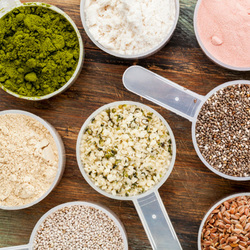 We all know how important adequate protein intake is for good health. Just to put everyone one on the same page here are the main benefits of protein in general. 1) Provides amino acids for muscle repair 2) Protein with each meal balances blood sugar which can aid in healthy weight loss 3) Amino acids from protein are used to make immune cells and neurotransmitters Despite our best efforts most people do not get enough protein from dietary sources alone or we tend to rely on animal proteins that are rich in saturated fats and acidifying amino acids. To maintain muscle building and breakdown the evidence has shown that sedentary individuals require at least 0.8g of protein per kilogram of body weight. This actually goes up to over 1g/kg of body weight for elderly and active adults. That translates to almost 50g of protein a day for an average 60kg (132lbs) women (assuming the bare minimum 0.8). Since getting this amount can be a challenge many people are turning to convenient protein powders to boost their daily intake. With so many options the big question health enthusiasts have is should they use whey or vegetable (soy, rice, pea, hemp etc.) protein? There are PROs and CONs to both. The following breakdown will help you make the decision that is best for you. Whey Protein (source: cow or goat milk) PROs (compare to vegan proteins) · Complete protein – Whey contains the full spectrum of all the essential amino acids. This is key for muscle function and growth · Higher in Branched Chain Amino Acids (BCAAs) – These specific amino acids (leucine, isoleucine, and valine) stimulate muscle growth and maintenance · Supports detoxification – Whey is higher in the amino acid cysteine which is the key precursor to glutathione, a powerful detoxifier and antioxidant. · Boosts the immune system – Our immune cells require amino acids to be produced but whey contains special molecules called immunoglobulins that stimulate immune function. - Contains Lactoferrin – a key immune boosting molecule which has a powerful anti-microbial and anti-cancer effect · Better taste than some veggie proteins – This point is debatable but most people prefer the taste of whey based proteins. CONs · Dairy “sensitivity and allergy - many people are "sensitive" (mildly allergic) or outright allergic to various components in dairy (including whey). This produces various symptoms such as digestive discomfort, headaches, and excess mucus production. For these people it also can increase inflammation at the level of the gut lining. Dairy is among the foods that are most allergenic (along with eggs, soy, wheat, corn and citrus fruits). · Dairy milk consumption is linked to acne, cancer and other diseases - Some studies suggest that dairy products can promote the growth of cancerous cells because of the high amounts to galactose, casein and insulin-like growth factor I (IGF-1). On the flipside calcium from dairy has been shown to prevent colon cancer. Overall the evidence is far from confirmed and is still considered controversial. Whey protein contains very little casein and galactose but because of the dairy source some people choose to avoid it · Possible contamination - with hormones and antibiotics and some studies do show that dairy products have a high level of dioxins and other environmental contaminants. This has not been confirmed in whey products. Veggie proteins (source: soy, pea, rice) PROs · Considered hypoallergenic – rice and pea protein is usually well tolerated by people. Soy can be a common food allergen so the above points about food allergies apply for it as well. - Part of a detox program – because rice and pea proteins are less allergenic they are usually part of functional foods that are used during detox programs such as an elimination diet. · Easier to digest – This point is debatable but theoretically if a food is not allergenic for a person they are better able to breakdown and digest it. CONs · Taste – the taste of veggie proteins (especially pea and rice) can be poorly tolerated by some people however this is personally preference. · Not optimal for muscle building – vegan proteins have lower amounts of amino acids required for muscle building and glutathione production compare to whey. · Possibly contaminated – There have been reports of rice proteins being contaminated with arsenic but this has not been confirmed and may have been an isolated incident. So there are PROs and CONs to both sources of protein. The choice is up to you but I think it comes down to personal preference and individual tolerability. If you are not dairy sensitive then a high quality whey protein can really offer some unique health benefits that are not present in veggie proteins. Otherwise you maybe better off with vegetarian sources. References Chernoff R. Protein and older adults. J Am Coll Nutr. 2004 Dec;23(6 Suppl):627S-630S. Grant EC. Food allergies and migraine. Lancet. 1979 May 5;1(8123):966-9. Chan JM, Stampfer MJ, Ma J, Gann PH, Gaziano JM, Giovannucci E. Dairy products, calcium, and prostate cancer risk in the Physicians’ Health Study. Am J Clin Nutr. 2001;74:549-554. L.-Q. Qin, J.-Y. Xu, P.-Y. Wang, T. Kaneko, K. Hoshi, A. Sato. Milk consumption is a risk factor for prostate cancer: Meta-analysis of case-control studies. Nutr Cancer. 2004 48(1):22 - 27. Larsson SC, Orsini N, Wolk A. Milk, milk products and lactose intake and ovarian cancer risk: a meta-analysis of epidemiological studies. Int J Cancer. 2006;118(2):431-441. B. Melnik. Milk consumption: Aggravating factor of acne and promoter of chronic diseases of western societies. J Dtsch Dermatol Ges, 7(4):364{370, 2009. 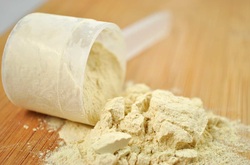 One of most controversial questions in the integrative oncology field is whether cancer patients should avoid whey protein. Some people contend that dairy products may increase the growth of cancer cells since they contain amino acids and growth factors. Dairy products do contain a molecule called insulin-like growth factor (IGF-1), which has the same activity as the naturally produced human form. As a clinician I recommend that patients avoid any foods that will up-regulate growth factors since that may contribute to the growth of cancer cells.1 So as part of an anti-cancer diet it would be prudent to avoid refined sugars (which also increases IGF-1 formation) and dairy products but does this apply to whey protein products as well? There really is no clear consensus on this question. The following are a few points we need to consider before forming an opinion. 1) It difficult to extrapolate data on food (milk products) to whey protein consumption. Milk contains much more IGF-1 than a good quality whey supplement. It also contains many other things that whey does not (fat, sugars etc.). Many people lump dairy products into the same category as whey but they actually are quite different and should not be considered the same. Just to be fair, some studies actually suggest that milk consumption has a cancer preventative effect (possibly due to calcium or immune stimulating compounds). 2) Whey and other animal protein consumption does increase IGF-1 levels in the blood.2 This actually occurs because the excess amino acids trigger the liver to produce our own IGF-1. Now this would be beneficial in an athlete or elderly person that is trying to build muscle mass but could it drive cancer? Interestingly, vegan proteins do not trigger IGF-1 and may actually reduce it.2 3) In some cases the anabolic nature of whey may be advantageous and even desired. For example, in cachexia (weight loss in cancer) whey protein is superior to veggie proteins (i.e. soy, rice etc.) in maintaining weight.3 Preventing or slowing weight loss in cancer is a very important therapeutic target. 4) A strong connection has been made between refined sugars, insulin stimulation, IGF-1 formation and cancer cell growth. Milk contains sugars such as galactose while whey protein does not. This is another strike against milk that does not necessarily apply to whey. On the flip side, a high protein, low carb (ketogenic) diets are often prescribed as an anti-cancer diet because it starves the cancer of sugars, which in turn does not increase insulin thus preventing growth factor formation.4 Whey protein is sometimes included as a part of this diet. 5) Milk contains casein, a protein has been suggested to strongly increase cancer growth according to Dr. T. Colin Campbell, the author of The China Study. This is quite controversial and some evidence actually suggests that casein and other milk protein may be cancer protective.5 Regardless, there is very little in whey. 6) Whey protein up-regulates glutathione production, a powerful cellular protector that prevents cancer formation, increases elimination of carcinogens and induces apoptosis.6 Vegan proteins do not increase glutathione in same as whey since they have lower levels of the amino acid cysteine, a key glutathione precursor. One interesting study that compared whey vs soy protein and found whey was superior in tumor prevention.7 7) American dairy products could contain recombinant Bovine Growth Hormone (rBGH) which is a VERY potent IGF-1 stimulator. rBGH is given to quickly stimulate the growth cows. It is unclear if this translates to whey protein but again this would primarily apply to dairy products and not whey. rBGH is not used in Canadian dairy cows. 8) Premier whey products (such as Advanced Whey Protein by AOR) contain lactoferrin and alpha-lactablumin, which have anti-cancer activity and stimulate the immune system.8 Emerging research is showing some impressive action against cancers such as non-small cell lung carcinoma.9 This adds a unique therapeutic angle that vegan proteins do not. Not every whey protein on the market has this added advantage so be sure to check. 9) Some people can have a food allergy or sensitivity to dairy and whey protein. This is not to be mistaken with lactose intolerance, which is an inability to digest lactose, a sugar found in dairy products. Dairy products, including whey protein, are common food allergens and if a person is sensitive then in may cause increased levels of inflammation and promote digestive irritation.10 Increasing inflammation is never a good idea for cancer patients so if you suspect dairy is causing you symptoms such as nasal congestion, headaches, bloating, gas or intestinal cramps then it would be best to avoid dairy or get tested by your naturopathic doctor. 10) Some people claim that the amino acid composition of whey protein contains more "acidic" amino acids, which promote a net acidic load on the body, impairing cellular function and potentially stimulating cancer growth. The acidic environment cancer theory is also controversial and I personally find the evidence weak for directly using alkalizing therapies but I do strongly advocate a diet high in vegetables and trace minerals (mg and k+) which are more alkaline and low in refined carbohydrates and meats which are acid forming. Considering the above points you can formulate your opinion if whey protein has an impact on cancer growth, positive or negative. I think the PROs outweigh the CONs and there are distinct advantages to using a high quality whey protein. An important point is that the type of protein you use may vary on personal preference, stage of cancer and if you have a food sensitivity to whey. After that, the choice is up to you. References 1) Cohen, Pinchas, et al. Insulin-like growth factors (IGFs), IGF receptors, and IGF-binding proteins in primary cultures of prostate epithelial cells. Journal of Clinical Endocrinology and Metabolism, Vol. 73, No. 2, 1991, pp. 401-07 2) Allen NE, Appleby PN, Davey GK, Kaaks R, Rinaldi S, Key TJ. The associations of diet with serum insulin-like growth factor I and its main binding proteins in 292 women meat-eaters, vegetarians, and vegans. Cancer Epidemiol Biomarkers Prev. 2002 Nov;11(11):1441-8. 3) Dillon et al. Cancer cachexia and anabolic interventions: a case report. J Cachexia Sarcopenia Muscle. 2012 Dec;3(4):253-63. 4) Victor W. Ho et al. A Low Carbohydrate, High Protein Diet Slows Tumor Growth and Prevents Cancer Initiation; Cancer Res July 1, 2011 71; 4484; 5) Phelan M1, Aisling Aherne S, O'Sullivan D, FitzGerald RJ, O'Brien NM. Growth inhibitory effects of casein hydrolysates on human cancer cell lines. J Dairy Res. 2010 May;77(2):176-82. 6) Bounous G1, Batist G, Gold P. Whey proteins in cancer prevention. Cancer Lett. 1991 May 1;57(2):91-4. 7) Hakkak R1, Korourian S, Shelnutt SR, Lensing S, Ronis MJ, Badger TM. Diets containing whey proteins or soy protein isolate protect against 7,12-dimethylbenz(a)anthracene-induced mammary tumors in female rats. Cancer Epidemiol Biomarkers Prev. 2000 Jan;9(1):113-7. 8) Pepe G1, Tenore GC, Mastrocinque R, Stusio P, Campiglia P. Potential anticarcinogenic peptides from bovine milk. J Amino Acids. 2013;2013:939804. doi: 10.1155/2013/939804. Epub 2013 Feb 26. 9) Rodrigues L1, Teixeira J, Schmitt F, Paulsson M, Månsson HL. Lactoferrin and cancer disease prevention. Crit Rev Food Sci Nutr. 2009 Mar;49(3):203-17. 10) Grant EC. Food allergies and migraine. Lancet. 1979 May 5;1(8123):966-9. 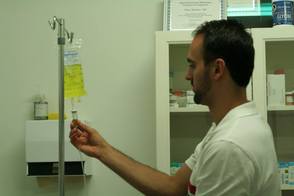 I have written extensively on the evidence supporting intravenous (IV) vitamin C used in combination with chemotherapy. This past week another study has shown a positive effect as a combo. It looked at ovarian cancer cells in mice that were given IV doses of vitamin C plus 2 commonly used chemo drugs, paclitaxel and carboplatin. They found the combo synergistically inhibited the cancer cells. The researchers stated that vitamin C increases the level of hydrogen peroxide which cancer cells are not able to deal with. This damages their DNA and causes them to die. Normal cells are unaffected by this since they are not dividing as quickly so their DNA is not as vulnerable. This is why vitamin C has very little side effects even when given in high IV doses. The same research group also went further and gave the vitamin C and chemo combo to 25 ovarian cancer patients. The results after 12 months were less side effects (bone marrow suppression, kidney/lung/liver damage, and nerve damage in the group that received vitamin C vs just chemo. The survival times were also 8.75 months longer in the vitamin C group compared with the placebo group. This evidence supports the combination of a vitamin C along with chemotherapy. Now conventional medicine is starting to see that natural substances like vitamin C do not interfere with chemo as previously thought but actually improve outcomes. I think most cancer patients can really benefit from this therapy since its relatively inexpensive, very safe and now shown again to be effective. More studies are needed to confirm its use in other cancer types but these results are much needed and very promising. In health, Dr Paul Hrkal Full article and commentary Article abstract: http://stm.sciencemag.org/content/6/222/222ra18 More information on Vitamin C New Research – High dose vitamin C shows promising Anti-Cancer Effect Vitamin C: IV vs oral - its all in the delivery! The Dual Action of Vitamin C in Cancer Therapy Dr Hrkal's recent article in vitality magazine 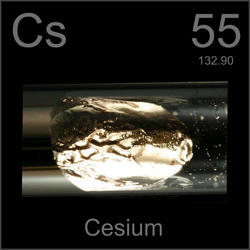 There was a recent report of a women from Colorado that died after self prescribing cesium chloride as an alternative cancer treatment. She was taking an oral cesium supplement along with injecting it into her breast tumor. A short time after one of these injections she was admitted to hospital and later died. There were high levels of cesium found in her blood stream and the apparent cause of death was cardiac failure. In the case of cesium, it displaces potassium and long term supplementation can cause severe electrolyte imbalances, arrhythmias, and death. So despite it being an "alkalizing" mineral it can disrupt the rest of your key electrolytes off and possibly causing heart issues. To read the full article click here She was taking the cesium as an alkalizing agent since some people believe that cancer cells thrive in a acidic environment and do poorly in an alkaline one. The research on this theory is still very preliminary. The area around cancer cells is more acidic than surround tissue but that is due to the lactic acid created by the cancer cells using anaerobic respiration (an inefficient pathway of energy production). While reducing the overall acidity in your body is a good idea (through eating vegetables and consuming minerals such as magnesium) there really is no evidence that "alkalizing" the area directly around the cancer cells will reverse or slow the cancer growth. Interestingly, alkalizing minerals such as cesium, rubidium, potassium and magnesium are found in the high concentrations in medicinal mushrooms such as chaga. Mushrooms have a large amount of evidence showing they are both safe and effective in support of conventional cancer therapies. One theory suggests that these minerals may be responsible for some of the anti-cancer effects of mushrooms however it is apparent that they are safest and most effective when consumed from a mushroom or food rather that directly supplementing ultra-high amounts. Caution is needed whenever you take any drug or natural substance. It is especially dangerous when a person attempts to self-diagnosis and self-prescribe based on what they read on the internet and hear from friends. There may be numerous factors that may make a seemly safe natural substance harmful. The best approach is to speak to a registered Naturopathic doctor especially when dealing with cancer. Some natural substances have been studied and proven safe and effective in supportive cancer care (i.e. mistletoe, vitamin C, medicinal mushrooms etc.) but there are many that have not been studied well and may not be safe. I look at this case report as a good opportunity to again reiterate that natural therapies need to be used with caution since they have a potent effect. When in doubt discuss each supplement with your Naturopathic doctor. |
Welcome To My Blog
My goal is to post thought-provoking and informative articles so you can learn and apply the latest news from the world of natural health. Feel free to post comments and start a conversation. Stay tuned to my twitter and facebook feeds for the latest posts.
Archives
December 2015
|


 RSS Feed
RSS Feed

